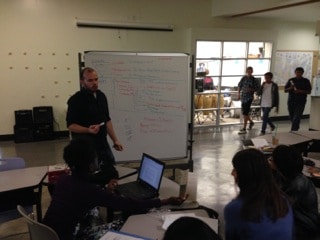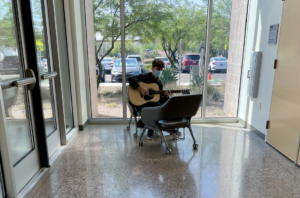Common Choice: Thin Test Prep or Deeper Learning

The two big change forces in American K-12 education are the adoption of common standards and tests of college and career readiness and the shift to personal digital learning. The last time states adopted standards and tests, the results were not as dramatic as hoped and they included the unintended consequence in many schools of months of test prep and weeks of testing.
Whether the adoption of Common Core and digital learning results in powerful learning experiences and better preparation or thinner test prep and more of the same is a function of leadership in America’s schools.
The Hewlett Foundation believes that all students deserve challenging learning environments for college, careers and citizenship. They believe students deserve deeper learning that results in content mastery and the ability to solve complex problems and communicate effectively. The Foundation believes, as recent research shows, that helping students develop an academic mindset is key to persistence and success in life.
The Foundation is helping school districts and networks reconsider their learning goals, support teachers, better evaluate what students know and can do.
While Congress is broken, some states are making thoughtful policy changes by taking advantage of ESEA waivers and Race to the Top grants to promote deeper learning as schools adopt common standards.
Critical actions. School improvement is complex. Creating a focus on results is a good first step for school and system leaders. But a preoccupation on narrow set of measures can result in a lifeless cycle of test prep. Good Schools Start With Good Goals— aspirations for schools that are engaging not boring, schools that develop entrepreneurial mindsets and service disposition as well as college eligibility.
As they think about common standards and new technology, school and system leaders should focus on three things:
-
Writing across the curriculum: there is no better strategy to promote deeper learning than to ask students to write every day in every subject. By high school, students should be writing 500 words a day and publishing weekly. A personal portable production device (like a laptop or chromebook) with a writing application that provides some automated feedback can help make this manageable for students and help teachers focus on critical thinking, voice, and argument. Students should be capturing examples of their best work across the curriculum in a digital portfolio and sharing work with parents and community audiences on a regular basis. The featured image is a writing intensive at High Tech High International where an English teacher is supporting a writing assignment in a science project.
-
Making math real: use engaging visual math games to build conceptual understanding; using adaptive assessment to quickly adjust learning levels, and connect math to real world problems.
-
Advisory that builds academic mindset: secondary students need an regular advisory period and a sustained adult relationship to practice habits of success, build persistence, encourage reflection, connect to support services, and develop a future focus.
Road ahead. There are three important investments on on the road ahead. States, districts, and foundations should invest in:
-
Teacher capacity: personalized learning isn’t just for students; every teacher should have an individual development plan with a library of on demand resources, should have the opportunity to plug into a professional learning community; and should work in a supportive team-based environment.
-
Better platforms: teachers deserve next-gen learning platforms that make it easy to customize a sequence of experiences for every student, to create engaging interdisciplinary projects, and to capture and track data from each experience.
-
Better measures: new state tests to be introduced next year will be better measures of writing, critical thinking and problem solving, but students and teachers would benefit from improved ability to measure academic growth as well as better measures of collaboration, academic mindset, and the ability to tackle new problems.
Higher expectations and engaging learning experiences are compatible. New college and career ready expectations will yield better preparation for American students if education leaders value deeper learning rather than resorting to stifling test prep.







Janet Brown
Excellent!